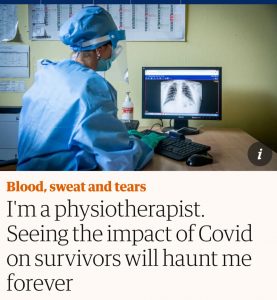After nearly a quarter of a century as a physiotherapist, I’ve found 2020 the most professionally thought-provoking year so far. Throughout my career, I have treated patients with everything from rare and fatal brain conditions to severe bends brought about by diving, but what I have seen with the coronavirus pandemic will haunt me for the rest of my life. While every case of Covid-19 is different, after a while you’ve seen most of the pieces of the jigsaw somewhere before. Instead, it is the level and scale of complex rehabilitation some survivors need to return them to their lives that truly scares me.
In the past, I have worked in the community helping patients achieve their goals at home. I have worked in neonatal, neurosurgical, cardiac and general intensive care units (ICUs). I have treated patients with conditions I can’t always spell, worked for the Ministry of Defence, and done a very brief stint lecturing in Ethiopia. I am now part of a triumvirate leading 2,000 staff and 22 different professions in Portsmouth.

I have seen the scans of the weird and wonderful. I have had the heart-sinking moments of looking at the level of trauma on a brain scan and wondering how on earth I was going to get this patient walking again. I have experienced the euphoria of succeeding in that quest.
But never have I seen the cracked-glass effect on lung CT scans like those of Covid-19 patients. I have stared at them wondering where the breath is coming from, worrying if they will be able to conjure up the respiratory effort to sit, stand, step, move, live. Those scans will skulk in the depths of my brain for the rest of my days.
Physiotherapists are not only part of multidisciplinary teams that save lives. We are also part of the multidisciplinary teams that give people their lives back. We want to ensure they are as independent and meaningful as possible.

Many Covid-19 patients have not survived. For those who have, the road to recovery is somewhat Everest-like. Once the brilliance of ICUs disappears from the public eye, it will be the turn of rehabilitation services. The scale of the task wakes me at 3am and switches my brain on instantly.
The “what ifs” flood into my sleepy consciousness. Do we have the staff, the pathways, the longevity for treatment programmes? Have we got the links needed across the NHS to join everything up? Have I done my part?
Combine Covid-19 with another condition, perhaps a stroke or a broken hip, and recovery is a Herculean task. It will be hard work to gain normal movements, to correct their gait, to reach using arm and scapula, to gain a pincer grip, to take their hand to their mouth, just to move their lips to kiss their loved ones. Coronavirus has added an extra layer of fatigue and breathlessness, the likes of which we have rarely seen before.
We have needed to collaborate across the NHS and in four months we have moved services faster than I can run 5km – but that 3am wake-up still interrupts my sleep. It will be a long time before I sleep well again.
Covid is testing our thought processes and every skill in our toolboxes. It affects each patient very differently. People with milder cases have tiredness, loss of appetite and decreased stamina, while others are so impacted they cannot sit on the edge of the bed without the physical support of four physiotherapists.
A particular patient, who was ventilated and sedated, has followed the full spectrum of symptoms. His rehabilitation has needed four physiotherapists to sit, and four staff with mechanical equipment to stand and to step. He required therapists to assist with basic daily activities like washing, dressing and cleaning his teeth. Every part of him slowed due to a fatigue so debilitating that progress is minuscule.
But progress has been made and this man is becoming more independent with the help of an entire team of therapists supporting his every move. It could take him the next 12 months to return to normal.
There is one thing I am confident of within the world of physiotherapy. No matter where a clinician works, there is an unwavering drive to succeed. Evenings are spent on Zoom talking to Chartered Society of Physiotherapy colleagues across the country to share, learn and set up pathways across the NHS. Local areas and trusts are liaising to improve patient care. You can rely on the tenacious, problem-solving nature of physiotherapists. We will not give up.
Fuente: The Guardian
 Blog de Fisioterapia Fisioterapia
Blog de Fisioterapia Fisioterapia



